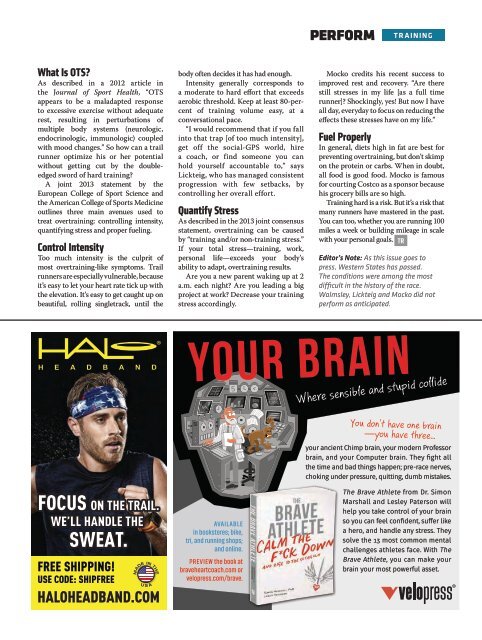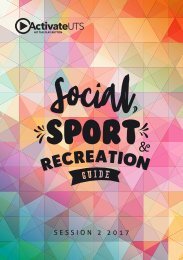Create successful ePaper yourself
Turn your PDF publications into a flip-book with our unique Google optimized e-Paper software.
PERFORM<br />
TRAINING<br />
What Is OTS?<br />
As described in a 2012 article in<br />
the Journal of Sport Health, “OTS<br />
appears to be a maladapted response<br />
to excessive exercise without adequate<br />
rest, resulting in perturbations of<br />
multiple body systems (neurologic,<br />
endocrinologic, immunologic) coupled<br />
with mood changes.” So how can a trail<br />
runner optimize his or her potential<br />
without getting cut by the doubleedged<br />
sword of hard training?<br />
A joint 2013 statement by the<br />
European College of Sport Science and<br />
the American College of Sports Medicine<br />
outlines three main avenues used to<br />
treat overtraining: controlling intensity,<br />
quantifying stress and proper fueling.<br />
Control Intensity<br />
Too much intensity is the culprit of<br />
most overtraining-like symptoms. <strong>Trail</strong><br />
runners are especially vulnerable, because<br />
it’s easy to let your heart rate tick up with<br />
the elevation. It’s easy to get caught up on<br />
beautiful, rolling singletrack, until the<br />
body often decides it has had enough.<br />
Intensity generally corresponds to<br />
a moderate to hard effort that exceeds<br />
aerobic threshold. Keep at least 80-percent<br />
of training volume easy, at a<br />
conversational pace.<br />
“I would recommend that if you fall<br />
into that trap [of too much intensity],<br />
get off the social-GPS world, hire<br />
a coach, or find someone you can<br />
hold yourself accountable to,” says<br />
Lickteig, who has managed consistent<br />
progression with few setbacks, by<br />
controlling her overall effort.<br />
Quantify Stress<br />
As described in the 2013 joint consensus<br />
statement, overtraining can be caused<br />
by “training and/or non-training stress.”<br />
If your total stress—training, work,<br />
personal life—exceeds your body’s<br />
ability to adapt, overtraining results.<br />
Are you a new parent waking up at 2<br />
a.m. each night? Are you leading a big<br />
project at work? Decrease your training<br />
stress accordingly.<br />
Mocko credits his recent success to<br />
improved rest and recovery. “Are there<br />
still stresses in my life [as a full time<br />
runner]? Shockingly, yes! But now I have<br />
all day, everyday to focus on reducing the<br />
effects these stresses have on my life.”<br />
Fuel Properly<br />
In general, diets high in fat are best for<br />
preventing overtraining, but don’t skimp<br />
on the protein or carbs. When in doubt,<br />
all food is good food. Mocko is famous<br />
for courting Costco as a sponsor because<br />
his grocery bills are so high.<br />
Training hard is a risk. But it’s a risk that<br />
many runners have mastered in the past.<br />
You can too, whether you are running 100<br />
miles a week or building mileage in scale<br />
with your personal goals. TR<br />
Editor’s Note: As this issue goes to<br />
press, Western States has passed.<br />
The conditions were among the most<br />
difficult in the history of the race.<br />
Walmsley, Lickteig and Mocko did not<br />
perform as anticipated.<br />
YOUR BRAIN<br />
Where sensible and stupid collide<br />
You don’t have one brain<br />
—you have three...<br />
your ancient Chimp brain, your modern Professor<br />
brain, and your Computer brain. They fight all<br />
the time and bad things happen; pre-race nerves,<br />
choking under pressure, quitting, dumb mistakes.<br />
AVAILABLE<br />
in bookstores; bike,<br />
tri, and running shops;<br />
and online.<br />
PREVIEW the book at<br />
braveheartcoach.com or<br />
velopress.com/brave.<br />
The Brave Athlete from Dr. Simon<br />
Marshall and Lesley Paterson will<br />
help you take control of your brain<br />
so you can feel confident, suffer like<br />
a hero, and handle any stress. They<br />
solve the 13 most common mental<br />
challenges athletes face. With The<br />
Brave Athlete, you can make your<br />
brain your most powerful asset.




